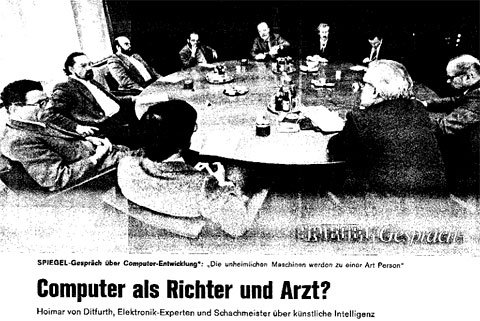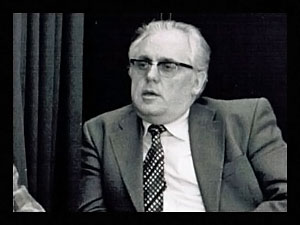Remembering Werner Harenberg
* 9th June 1929 – † 14th February 2014
In 1979 I was a rookie science journalist, writing and producing documentaries for the national German TV channel ZDF. After many interesting projects I one day discovered that computers (would you believe it) were able to play chess. So we made a documentary on the subject, and part of it was IM David Levy in our TV studio in Hamburg playing the program Chess 4.8. The moves were executed by a robot arm, which was directly controlled by a giant mainframe located in Minneapolis, USA.

It was a spectacular setup and a very interesting game which attracted wide attention in Germany. ZDF received over 90,000 letters commenting on the documentary and asking for the moves of the game (in those pre-Internet days).
While we were taping the game in the studio there was a senior editor of the weekly news magazine Der Spiegel – which is the German equivalent of Time and Newsweek – in the audience, watching attentively. Afterwards he contacted me and researched the background of the subject. When the documentary was aired the Spiegel came out with a five-page article on it. I have discovered that the Spiegel report (in German) is still in the archives:

Schach-Computer: Jahrtausende pro Partie and Mit dem 9. Zug schien der Schotte verloren.

The man in the audience, whom I found in the above archive photo, was Werner Harenberg, who subsequently became a friend and mentor (see below).
Soon after the Levy game Der Spiegel organised its own match, pitting Viktor Korchnoi against Chess 4.8. You will find the story (hard copy below) and the game in the Spiegel archives here, in German, but Google makes a valiant attempt to translating such reports.

And after that Harenberg organised a big round table discussion on artificial intelligence with a number of experts, including my TV boss Hoimar von Ditfurth (the German equivalent of Carl Sagan – the Youtube link is to a wonderful two-part documentary we made on the Egyptian pyramids).

Interest in chess
 Werner Harenberg's interest in chess in general grew, and in November 1981 he published a book on the great chess world champions. I received a copy with a personal dedication, and I cannot count the number of times I have consulted this book when researching a chess story. There are still some used copies on the Internet, and it's well worth getting them before they are snapped up by collectors.
Werner Harenberg's interest in chess in general grew, and in November 1981 he published a book on the great chess world champions. I received a copy with a personal dedication, and I cannot count the number of times I have consulted this book when researching a chess story. There are still some used copies on the Internet, and it's well worth getting them before they are snapped up by collectors.
I learnt many of the basics of print journalism from the experienced Spiegel editor. He hammered the main points into me: rigorous honesty (a sine qua non for the Spiegel journalist), extensive fact checking, finding a proper story line, making complex material accessible to a lay audience – and the complex subject of journalistic licence.
This last point was most instructive, and I give you an example of how it works. In 1990 Harenberg invited both Kasparov and Karpov, who were at peak hostility against each other, to an adversarial discussion – a Streitgespräch – in Der Spiegel. Unfortunately the two were unable to conduct a satisfactory face-to-face discussion and the result was quite disappointing. In interviews with each of the two champions separately they were much more forthcoming.
The choice was clear: the Spiegel could print a fairly tepid discussion between the two arch-rivals, or one could add the things they said when they were apart in an editorial story on the side.

Learning the ropes: Frederic Friedel with Werner Harenberg in Der Spiegel offices
Werner Harenberg chose a third path: he rewrote the discussion, filling it out with material he had got from each of the players separately. He then presented Kasparov and Karpov with the text, which the former immediately accepted. Getting authorization from Karpov, however, proved more complicated. At his funeral Harenberg's son Jens Ulrich recalled the trip to Moscow and then to Biel, where Karpov finally consented. The story was one of the highlights of Der Spiegel's reporting on chess.

The famous Spiegel "Streitgespräch" from October 1, 1990, is still online and available
as a PDF. A slightly quaint but comprehensible translation is provided by Google.
There is more to tell about Werner Harenberg and all the things he did for chess. This includes an important role he played in Garry Kasparov's career, and even in the founding of our company ChessBase. And since it all happened in Der Spiegel it is meticulously archived. So the current article is the first part of my eulogy, and it will be continued in the near future.
Werner Harenberg passed away on 14th February 2014, at the age of 84, after a protracted illness. The in-memorium notice we all received expresses my feelings perfectly, so that additional words are not necessary. That is another lesson I learnt from him: leave perfection alone, don't spoil it with comments.
|
We can weep because you are gone
or we can smile because you lived.
We can close our eyes and hope
that you return, or we can
open our eyes and see all the things
that you have left behind for us. |
Wir können weinen, weil Du gegangen bist
oder wir können lächeln, weil Du gelebt has.
Wir können die Augen schließen und hoffen,
dass Du wiederkommst oder wir können
die Augen öffnen und all das sehen, was Du
uns hinterlassen hast. |























 Werner Harenberg's interest in chess in general grew, and in November 1981 he published a book on the great chess world champions. I received a copy with a personal dedication, and I cannot count the number of times I have consulted this book when researching a chess story. There are still some used copies on the Internet, and it's well worth getting them before they are snapped up by collectors.
Werner Harenberg's interest in chess in general grew, and in November 1981 he published a book on the great chess world champions. I received a copy with a personal dedication, and I cannot count the number of times I have consulted this book when researching a chess story. There are still some used copies on the Internet, and it's well worth getting them before they are snapped up by collectors.






